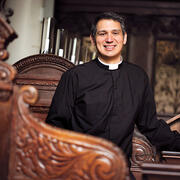
The Reverend Matthew Ichihashi Potts, Plummer Professor of Christian Morals at HDS, and Pusey Minister in the Memorial Church, delivered the following remarks at Morning Prayers in Harvard's Memorial Church on December 8, 2021.
♦♦♦
Before I talk to you about our daily saint, or our weekly saint perhaps, today is the last morning prayers service of the fall term. And I have to run to a doctor's appointment. I will not run. As fast as my legs can carry me, I have to go. So I'm not going to be outside to greet you after the service this morning. And I just wanted to thank you all for what a wonderful discipline this has been for me each week here. I'll confess that it did not always feel wonderful on Tuesday nights when I was researching obscure facts about some random saint from church history. But being with you each Wednesday morning has been a gift and I look forward to resuming it in the spring term. So thank you.
Speaking of saints, we don't have one in my church calendar assigned for today. Yesterday was Ambrose in Milan, who's a great one. Talk about him next year maybe. Monday, it was Nicholas of Myra, patron of sailors and children, the saint you know perhaps more about and less about than any other saint, because he's better known by the Dutch derivation of his name, which is Santa Claus. Nicholas was a Bishop in Western Turkey, what is now Western Turkey, then Asia minor, Bishop of a small seaside town called Myra. And we know nothing of him that's factually reliable. There's some good legends circulating around him and a cult developed around Nicholas in the middle ages because of the kind of drama of these legends.
The most famous is that he rescued three sisters from slavery, but it was from a poor family. The father didn't have dowries for his daughters. And so in the middle of the night, he walked by the house and he threw some money through the window each night for three consecutive nights, enough for a dowry of each, and saved them each from slavery. In one version of the story, he threw the money through the chimney and it fell down and the girls' socks were hanging to dry by the chimney and the money fell in the socks. Because he went in the middle of night, he was represented with a cowl and a night dress, which is why Santa Claus is represented the way he is. And this is a less common tradition, I think, in the United States, at least recently, but in icons of Nicholas, he's shown with these three gold, first they were three gold coins and they eventually were represented as three gold balls or baubles, which is where, if you remember the tradition of giving oranges at Christmas, it's because those gold balls look like oranges.
There are other more dramatic legends. One is that he was temporarily defrocked for punching Arias at the Council of Nicaea, the heretic Arias. And this was actually a very popular one in the middle ages, is that he resurrected three children whom a butcher had slaughtered and pickled in brine to sell as hams. And it's said that Nicholas saw through this butcher's schemes and said a blessing over the pickled barrel and then three children jumped up.
As I said, we don't know much. We believe that Nicholas was probably imprisoned and tortured under the Emperor Diocletian during the Diocletian persecution. And scholars and historians think there must be some kernel of truth to his record of generosity to people and to children. You could do worse than have a whole cult of generosity and giving in your name and around your legend.
There's a song by the popular singer Regina Spektor called "Laughing With," where I think she quite rightly says the wrong idea of God is an idea of God like Santa Claus, who grants wishes when you're good. I think that probably is a wrong idea of God. And in our house, two of our three children still believe in Santa Claus and in our house, we don't do the naughty and nice thing. You don't get gifts because you're good or fail to get them because you're bad. Colette had some misgivings about constructing an elaborate lie to our first child when we started observing Christmas as a family. And to be fair, when Cammy found out, it was hard. She felt lied to. And like a lot of folks we're suspicious of all the consumerism that accretes around the way we observe gift giving at Christmas in this country.
But if there are problems in thinking about God like Santa Claus, or at least in the version that Regina Spektor describes, there's also something important from the perspective of a child about a person you've never met before just wanting to be generous to you and loving you just because. The sort of surprise on Christmas morning, this man we'd never met shows up and gives gift and knows nothing about me except that I am. There's something special about communicating that to a child somehow, and for a child to know it's true of every other child in the world, that they each are that special and deserve that much as well.
When Cammy found out that the legends around Santa are mostly just legends, we told her that Santa Claus isn't true, but that part of the story is true. Each child is that precious. And we invited her to join us in trying to make it more true in our world. As we approach Christmas this year and in the weeks until I see you before we resume morning prayers, I invite you also to make this that truth more true among those children for whom it needs to be made true.